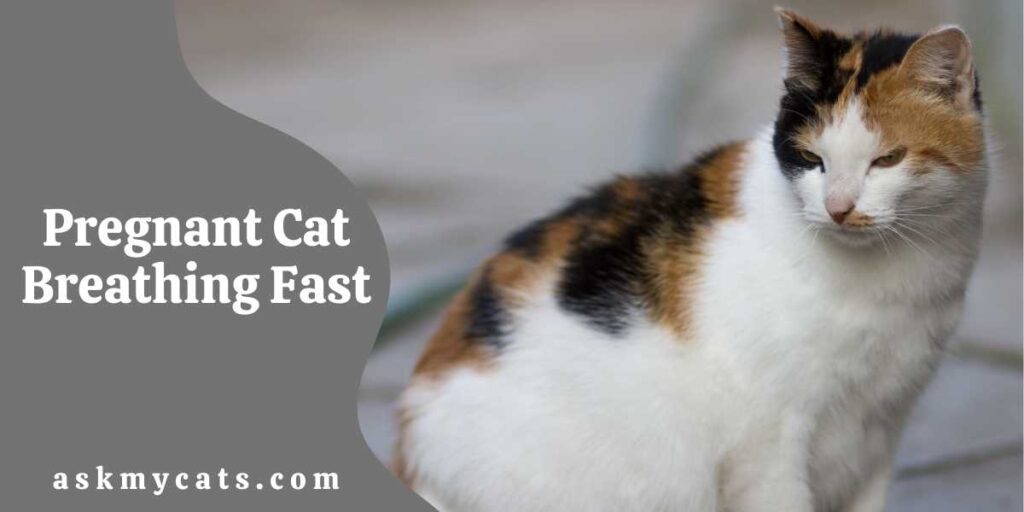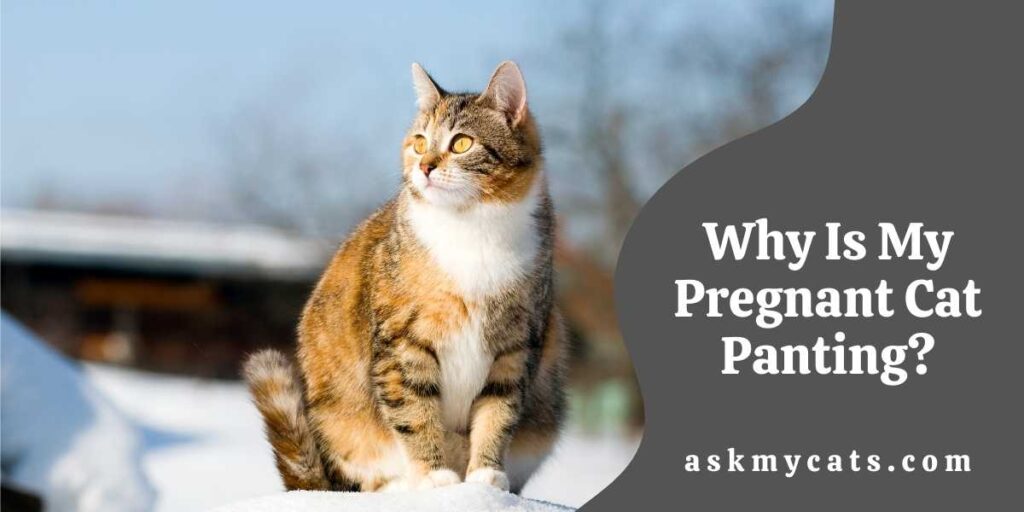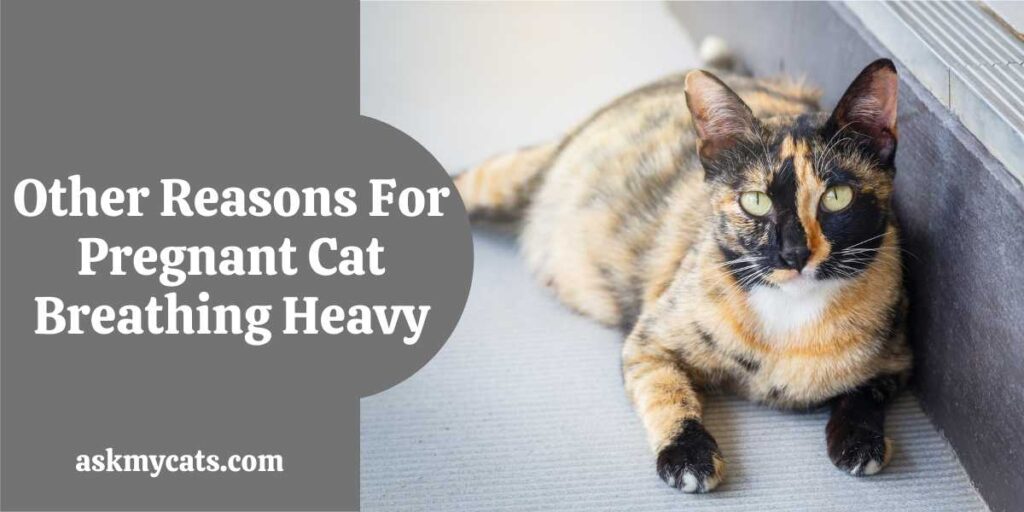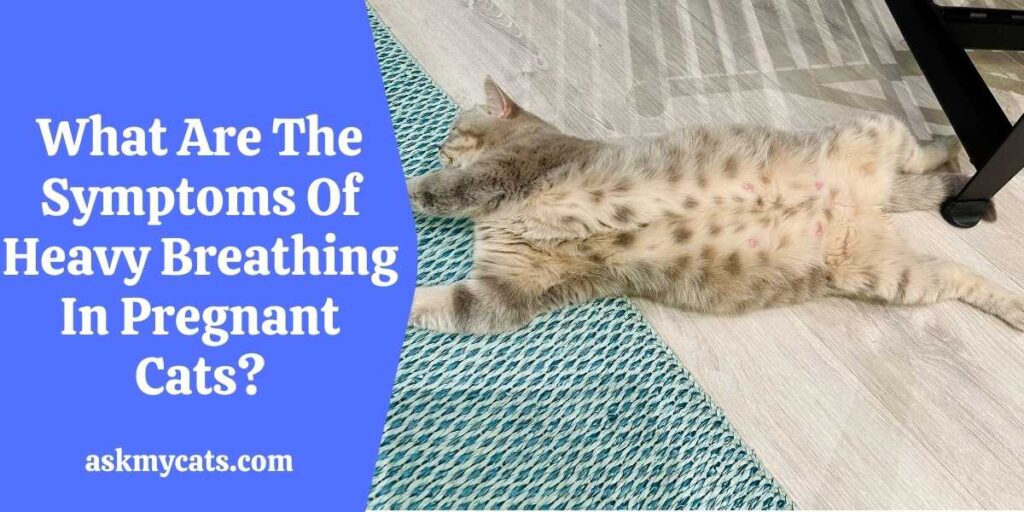If you see your pregnant cat panting (open-mouth breathing) or breathing heavily, quickly, or erratically, it’s worth investigating more.
Abnormal breathing in pregnant cats can be caused by a number of factors, which you should investigate one by one. Fast breathing in pregnant cats isn’t always a cause for concern, but it can potentially suggest serious health problems.
So, do pregnant cats breathe fast?
Yes, pregnant cats do tend to breathe fast, possibly to comfort themselves. If you put your hands on her belly, you’ll be able to feel the contractions.
This article will try and answer all your questions about your pregnant cat breathing fast.


Give Your Cat the Perfect Day
Get the Free Ebook!
What Is Rapid Breathing In A Pregnant Cat?
Rapid breathing in a pregnant cat can be defined as more than 30 breaths per minute when resting calmly or sleeping.
To determine whether a cat is breathing rapidly, first learn what a healthy respiratory rate (breathing) for a cat is, which is 20 to 30 breaths per minute while the cat is resting or sleeping.
Breaths should cause minor chest movements; if your cat’s sides are moving a lot, it could be a sign of hard breathing.
If your cat’s breathing seems unusual, you should be concerned. It’s exceptionally sluggish, fast, or noisy (a high, harsh, or whistling sound), or the cat is having trouble breathing.
Count the number of breaths your cat takes while sleeping to determine its resting respiratory rate.
Check out the reasons behind cat breathing heavily while resting
The chest of your cat rises (inhaling) and falls (exhaling) throughout one breath (exhaling). Time 30 seconds on your phone or watch and count how many breaths you take throughout that time.
To get the number of breaths in a minute, multiply the number of breaths you counted by two.
Tachypnea is a condition in which your cat breathes more than 30 times per minute while at rest.
Why Is My Pregnant Cat Panting?
One, of the reasons for your pregnant cat to be panting, is to comfort herself.

There are certain symptoms that your cat may be pregnant.
Many are eerily identical to the ones we’re familiar with from humans.
Cravings for specific meals, as well as morning sickness and a rapidly increasing tummy with heavy panting, are indicators.
Even if your cat has more appetites than usual and grows larger around the waist, this does not necessarily imply that babies are on the way!
However, if this is accompanied by morning sickness, swollen nipples, and your cat is considerably more attentive than usual accompanied by heavy panting the indicators could indicate that you will soon be welcoming extra kittens into your home.
Cats are one of the most prolific animals on the planet. A non-neutered cat can have three litters per year! It can become pregnant as soon as it is fertile and receptive.
The fertile, or “on heat” days are those when your cat is most likely to become pregnant. This can happen every two to three weeks if the cat is receptive and not neutered.
Many cats will get restless prior to the onset of labor, looking for their birthing site or going to the litter box repeatedly.
They’ll walk around looking for a place to give birth, even if one has already been chosen. Some will breathe harder, or their mewing will become louder and more piercing.
Premature contractions can already be felt in this stage, with the belly contracting more often.
Most cats pant and vocalize when they are in labor, and they may become restless and pacing about like they are hunting for something.
You can try to make your cat feel at ease in the location where you want her to have her babies (you may already have a box or an area set up), but don’t push the matter.
You should simply support her if she chooses a new area. You don’t want to irritate her or for her labor to be disrupted at that point.
You might also like to know why is my pregnant cat meowing so much
Other Reasons For Pregnant Cat Breathing Heavy
Other reasons that include pregnant cats breathing heavily are: –

Allergies: Pregnant cats, like people, can be sensitive to certain foods or airborne particles like pollen.
Anemia: This is a disorder in which there are insufficient red blood cells. It can be caused by a variety of factors. Because red blood cells transport oxygen, anemia can cause fast breathing as a means of compensating for decreasing blood oxygen levels.
Asthma: Asthma causes the airways of the pregnant cat to tighten, making breathing difficult.
Emotional distress: When your pregnant cat is scared, agitated, or furious, it will breathe faster than usual. However, once the cat has calmed down, the respiratory rate should return to normal.
Exertion: A pregnant cat that is having a lot of fun, exercising, or otherwise exerting itself will breathe faster than usual. When the cat relaxes, though, the respiratory rate should return to normal.
Heart Disease: Due to the heart’s diminished ability to circulate oxygenated blood throughout the pregnant cat’s body, congestive cardiac failure, as well as other heart diseases, can induce fast breathing.
Pain: Pregnant cats in pain often breathe rapidly in response to stress.
Pleural effusion is a type of pleural effusion that (abnormal accumulation of fluid within the chest cavity) The ability of the heart and lungs to perform normally is hampered by fluid in the chest cavity, resulting in an elevated respiratory rate and other indicators of respiratory distress.
Edema of the lungs (lungs filling with fluid) The lungs are unable to effectively oxygenate the pregnant cat’s blood under this situation, resulting in an increased rate of breathing to compensate.
Interesting Read: Why Is My Pregnant Cat Purring So Much?
If your pregnant cat swallows a toy, a piece of food, or another foreign object that plugs the airways, it will struggle to breathe in and out.
Infections in the respiratory system, such as pneumonia, can cause the pregnant cat’s respiratory rate to increase.
Trauma, poison exposure, or injury: Trauma can cause rapid breathing in pregnant cats as a reaction to the shock or as a result of injury to the respiratory system.
Rapid breathing could be a symptom of a tumor in the chest or neck that is large enough to obstruct the regular movements of the lungs and heart or takes up space in the pregnant cat’s chest.
Tachypnea (rapid breathing) is not a sickness in and of itself, but it can be a sign of a more serious or even life-threatening condition.
It’s natural, or at least not surprising, for a pregnant cat to breathe fast when it’s agitated, overheated, or playing excitedly, but it’s strange if it’s breathing rapidly while at rest, especially if it’s also lethargic or unwell.
Tachypnea in your cat can be an indication of a multitude of problems, ranging from stress to heart disease, and it means your cat isn’t getting enough oxygen through its system.
Cats are notorious for hiding indications of illness from their owners, so cat owners must be extra cautious to spot symptoms like rapid breathing.
Being aware of your surroundings may aid in determining the reason for fast breathing or the conditions in which it occurs.
If your cat continues to breathe fast, it’s crucial to seek veterinarian assistance since tachypnea might be an indication of serious illness.
Also, check out Cat Panting After Giving Birth: Know Possible Reasons
What Are The Symptoms Of Heavy Breathing In Pregnant Cats?

The symptoms of heavy breathing in pregnant cats include: –
- Rapid rising and falling of the stomach or chest
- Open mouth breathing (panting)
- Coughing
- Gagging
- Breathing with the elbows sticking out from the body
- Noisy breathing
- Lethargy/fatigue
- Blue color to the gums
- Difficulty breathing
- Exercise intolerance/reluctance to move
Heavy breathing in pregnant cats could indicate an underlying health condition, and rapid breathing is generally accompanied by a slew of other symptoms. Any problem breathing is a medical emergency that necessitates immediate veterinarian intervention.
The most visible sign of heavy breathing in pregnant cats is rapid stomach and chest rising and falling, indicating that the cat is breathing quicker than normal.
Your cat’s sides may appear to be sucking in and out with each breath at times. Your cat may kneel down with its elbows extended out somewhat from its body and its head stretched forward to help it breathe easier.
A cat who is having trouble breathing will pant through an open mouth and may appear nervous or panicked.
With each breath, you may hear aberrant respiratory sounds such as whistling, wheezing, or moans, depending on the source of the rapid breathing.
It’s possible that your pregnant cat will cough or gag. Your cat’s gums may seem bluish if the breathing trouble is severe, indicating a shortage of oxygen.
Loss of interest in play or other activities, sleeping more than normal, loss of appetite, lethargy or sadness, and irritability are all symptoms that might accompany breathing issues.
You might also like to know about do cats pant when stressed
How To Treat Heavy Breathing In Pregnant Cats?
Rapid breathing is a symptom of a medical problem, and the therapy depends on the severity of the condition and the diagnosis.
If your pregnant cat is having trouble breathing, the veterinarian or veterinary technician may take it to the treatment area as soon as they arrive to help stabilize it. This will entail using a mask to provide oxygen and inserting an IV catheter to provide emergency medications and fluids.
If a foreign object becomes lodged in the cat’s airway, the veterinarian will attempt to remove it manually if possible or perform emergency surgery if the object is too large to reach.
A thoracentesis will be performed in cases of pleural effusion to remove fluid from the chest, which will assist breathing and provide a fluid sample for analysis to the veterinarian.
If a heart disease is a concern, x-rays, and echocardiography of the heart will be performed once your cat has been stabilized to assess the size and function of the heart.
In situations of viral or inflammatory disorders, or if the veterinarian feels allergies are to blame, antibiotics, allergy medicines, and anti-inflammatories will be administered. It’s better to remain as calm as possible if your cat is experiencing respiratory distress.
Your veterinarian will be able to best advise you on how to transfer your cat if traveling is traumatic for it.
Also, check out Do Cats Breathe Faster When Purring?
Frequently Asked Questions
How to diagnose heavy breathing in cats?
Consider any evident things that may be affecting your cat’s rapid breathing and remove them from his or her environment. Emotional distress and heat are two issues to consider. If your cat is panting because of the heat, remove them from the heat as quickly as possible and make sure they have access to water. If your cat’s breathing rapidly returns to normal, you know the issue was a reaction to the situation rather than an underlying health condition. If rapid breathing persists after the likely reason has been eliminated, seek veterinarian help. The veterinarian will examine your pregnant cat’s breathing pattern, listen to their chest for evidence of abnormalities such as a heart murmur or fluid in the lungs, and check the color of your cat’s gums to see if oxygen is being transported to the organs adequately and perform a full body examination. Blood tests will most likely be performed to rule out any underlying illnesses, as well as X-rays and/or ultrasounds to evaluate the lungs and heart.
How to prevent heavy breathing in pregnant cats?
You can’t always prevent fast breathing in pregnant cats because there are so many things that can cause it. However, you can help your cat prevent health problems by taking her to the vet on a regular basis, providing her with balanced, healthy food, ensuring that she is at a healthy weight, and avoiding situations that can stress, terrify, or overheat her.
Final Words
There’s no need to be concerned if your pregnant cat is breathing heavily in the majority of cases. However, in rare circumstances, the cat may be in pain or have an underlying medical condition, so it’s advisable to get medical advice from a veterinarian.
Ask us questions in the comments section if you have any.
Also, check out Do Pregnant Cats Sleep A Lot? Is It Normal?
